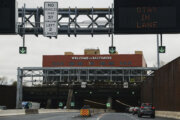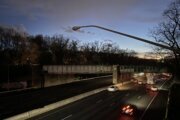BEIRUT (AP) — On his first public visit touring the destruction wreaked by this week’s deadly earthquake that hit Turkey and Syria, Syrian President Bashar Assad on Friday pointedly shamed the West for shunning his country.
The embattled president may see the disaster, which shattered much of northern Syria, as an opportunity to push for an easing of his country’s isolation — if not from the United States and the European Union, which have enforced sanctions for years over the long, brutal civil war, then from Arab nations.
“The West prioritized politics over the humanitarian situation,” Assad told a group of reporters while visiting the Aleppo neighborhood of Masharqa, devastated by Monday’s 7.8-magnitude quake. “It’s natural that they politicize the situation, but there is no humanitarianism, neither now nor in the past.”
Assad’s carefully choreographed tour came five days after the quake hit, a contrast to Turkish President Recep Tayyip Erdogan, who has been visiting devastated parts of Turkey for several days.
The tragedy presents a danger for Assad from the sheer weight of new misery the quake brings to Syrians. The country has been crippled by an economic crisis that has pulled 90% of its population into poverty. Now as many as 5.3 million people may have been left homeless in Syria by the disaster, the U.N. refugee agency estimated.
Major fighting in the 12-year-old civil war eased years ago, but Syrians have only seen conditions get worse. Many were already struggling to afford food and fuel for heating. Rising frustration has sparked rare protests and critical voices against Assad in government-held territory for the first time in a decade. Failure to deliver aid or recover from the quake could further stoke public discontent.
The quake — the world’s deadliest in decades with more than 23,000 dead — left widespread destruction across southeastern Turkey and northern Syria, both in the last rebel-held pocket of territory in the northwest and in swaths of government-held territory, particularly the city of Aleppo.
Officials in Assad’s government claim American and European sanctions are obstructing delivery of aid to Syria and slowing down search and rescue operations to save families still trapped under the rubble.
“Assad is trying to exploit the earthquakes to get out of international isolation,” Lina Khatib, director of the Middle East and North Africa program at Chatham House, told The Associated Press.
“His regime’s call for the lifting of sanctions is an attempt at de facto normalization with the international community,” she added.
The EU said Syria did not formally request aid until three days after the quake, and six member countries are sending help via the U.N.’s World Food Program. The U.S. said it has temporarily lifted sanctions that would hamper earthquake relief. Assad and Syrian officials have not commented.
But the U.S. and the EU have made clear they will not end the sanctions imposed over Assad’s crackdown on the opposition and his forces’ brutal methods against rebels in the civil war.
Assad himself has not called for sanctions to be lifted since the earthquake. Khatib said she expects he won’t do so because it would make him look weak in front of his people after years of hard-line rhetoric against Western countries.
He may see hope in Arab countries.
Assad’s closest allies, Russia, Iran and China, all sent aid after the disaster. But so did key U.S. Arab allies, notably the United Arab Emirates, Egypt, and Jordan.
Arab countries that shunned Syria since 2011 have been slowly reestablishing diplomatic ties with Damascus. A growing number of countries have called for Syria to be reinstated into the Arab League.
“These dynamics were already in place, led by the United Arab Emirates,” and the earthquake could accelerate them, said Nadim Houry, executive director of the Arab Reform Initiative, a think tank.
The quake allows Arab countries “to work in a non-controversial manner due to the humanitarian urgency and provides space for this rapprochement to materialize,” he said.
Delays in getting aid into opposition-held northwestern Syria have renewed debates about the U.N. system already in place to provide humanitarian help to the territory.
U.N. aid is delivered through a single border-crossing from Turkey because Russia has blocked the use of a second. The United Nations has also been delivering some aid to the rebel-held northwest from within Syria, across conflict lines, from Damascus.
U.N. spokesman Stephane Dujarric said Friday that the U.N. has been in contact with the Syrian government about getting a cross-line convoy into the northwest quickly.
Assad and Russia have called for aid deliveries to the enclave to be done exclusively through Damascus, which the U.N. agencies and Western countries oppose, fearing he would divert aid to supporters. But experts say the Syrian leader and Moscow may use the urgency of the situation to push for a change.
“There is an urgent need now for more assistance. There needs to be a solution that doesn’t get politicized, while at the same time does not play into the hands of the regime,” Houry said.
___
Associated Press writer Edith M. Lederer at the United Nations contributed to this report.
Copyright © 2024 The Associated Press. All rights reserved. This material may not be published, broadcast, written or redistributed.







